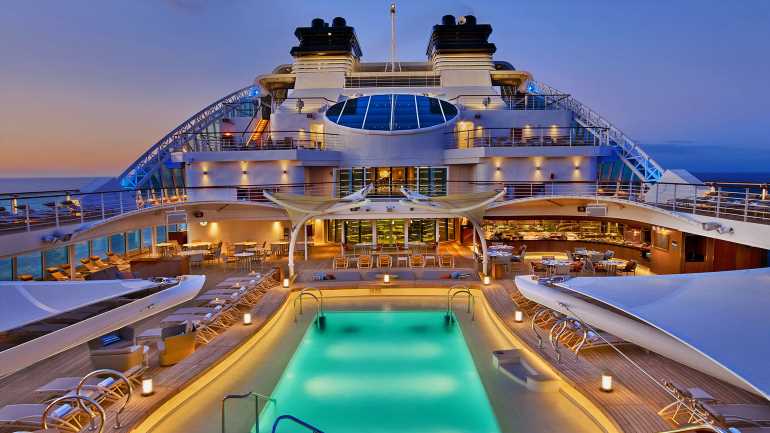Cruise sales rise as Covid cases fall, but uncertainty for '22 persists
Michelle Fee, the CEO of Cruise Planners, is optimistic.
In the last three weeks, she noticed her company’s volume of cruise bookings resembled those of a pre-pandemic 2019.
As the Covid-19 omicron variant wanes, she said, some people aren’t ready to hop on a ship right now. But her company’s bookings show that they still plan to. Bookings for close-in travel and the Caribbean are dragging, she said, but voyages further out, for Alaska and Europe, are strong, making up 24% of all purchase destinations. Bookings on luxury ships were up, too, 24% higher than average in January.
From Fee’s perspective, the industry is now in a “delayed Wave season,” she said. “We feel like we’re very, very close to getting this behind us.”
For others in the industry, the outlook is mixed. In the span of two weeks, three of the largest cruise line corporations came out with expectations ranging from bullishness for a strong second half of 2022 to sober predictions of potential weakness.
Carnival Corp. tempered what had been rosy expectations late last month. Not only was January difficult with higher cancellations due to complications from the highly contagious omicron variant, but bookings into the second half of 2022 were “dampening” relative to 2019, the company revealed in a 10-K filing.
One week later, Royal Caribbean Group was more optimistic. During the company’s fourth-quarter earnings call, its executives waved goodbye to profitability in the first half of the year but told investors there was a bright side: bookings increased as omicron subsided. By the time of the Feb. 4 call, bookings were back to pre-omicron levels, the company reported, adding it does not expect omicron to impact demand for cruising or its overall trajectory for recovery.
“The more the positivity rate drops, the more the bookings increase,” said Royal Caribbean International CEO Michael Bayley. “It’s becoming quite typical.”
Four days later, Norwegian Cruise Line Holdings (NCLH) said it was experiencing a strong booking position for the second half of 2022, in line with 2019. The company said it was holding its pricing above 2019 comparable levels and expects to reach profitability in the second half of the year.
While major cruise lines argue that pent-up demand to travel will remain strong through 2022, Truist stock analyst Patrick Scholes is skeptical. He contends the weak demand trends for booking in the first half of the year could bleed into the last half and lead to price drops to fill ships. He also said that NCLH’s second-half booking position, now in line with 2019, is a downgrade from its November guidance, when it said bookings in the second half of this year were “meaningfully higher than 2019.”
“Our proprietary research strongly suggests that omicron is having a bigger impact on business than delta,” said Scholes. Noting conversations with senior executives at large, cruise-focused travel agencies and data on future booking and pricing, he said, “For the moment, cruise lines are holding their breaths on [the second half of 2022] and do not want to cut pricing until they absolutely have to.”
Luxury is a bright spot
The bright spot for the industry, according to travel executives and analysts, is the strong demand for luxury. According to Scholes, this is an advantage for NCLH, where luxury accounts for about one-third of its business, he said. Luxury offerings from Royal Caribbean Group and Carnival Corp. account for about 10% and 5% of their businesses, respectively.
But it also highlights a trend: luxury cruises and destinations like Alaska and Europe are often booked far in advance by travelers who agree to Covid protocols like vaccinations to sail. Mass market bookings tend to attract a wider swath of travelers who may not be vaccinated, shrinking the pool of potential customers, according to Scholes.
David Crooks, senior vice president of product and operations for World Travel Holdings (WTH), shares some of the hesitancy that the industry will return to normalcy by the end of the year.
“When the news gets more negative, bookings are more negative. As soon as the news even gets slightly better, we see a very strong uptick, which shows us the demand is there, but it has to be the right environment,” said Crooks.
In January, he said WTH went from having the “worst two weeks” as the omicron variant surged to one of the best weeks the company has had since the pandemic began. He recently saw a burst of last-minute Caribbean bookings and attributes that spike to a low price point.
Beyond consumer demand, other complications continue to pepper the industry. While the CDC backed off its warning that Americans should avoid cruise travel, the agency is implementing new regulations for ships. One change creates three tiers of vaccination status, the highest requiring that 95% of passengers be boosted. CLIA criticized the move as confusing to both cruise lines and customers.
Travel executives also are turning their attention to the Russia and Ukraine border crisis and worry any escalation could deflate enthusiasm for cruises to Europe. That concerns Anthony Hamawy, president of Cruise.com.
“If there’s a war, what size will it be? Will it spread into Europe? Will the fear be enough in neighboring countries that it affects demand there?” he said, illustrating the anxiety. “We’re a fragile industry right now because of the hell we’ve been through.”
Source: Read Full Article






